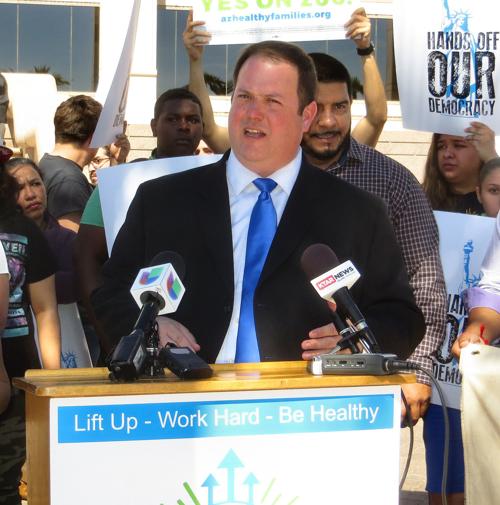PHOENIX — A judge has blocked efforts by Gov. Doug Ducey and the Republican-controlled Legislature to create new exceptions to laws that require disclosure of campaign finance spending.
In a ruling released Wednesday, Maricopa County Superior Court Judge David Palmer said a 2017 measure unconstitutionally conflicts with a 1998 voter-approved law designed to reduce the influence of money on politics.
Wednesday’s decision most immediately limits the ability of political parties to spend unlimited dollars on behalf of their candidates without disclosing the expenditures. It also voids some exemptions that lawmakers created in campaign finance laws, like allowing people to pay the legal fees of candidates without it counting against the legal limit of how much financial help they can provide.
But attorney Jim Barton, who represented those challenging the 2017 law, said the most significant part of the ruling is it restores the right of the voter-created Citizens Clean Elections Commission to police and enforce campaign finance laws against all candidates and their donors, not just those who are running with public financing.
That is significant because the 2017 law stripped the commission of that authority, giving it to the Secretary of State’s Office. But it is the commission that has adopted — and has enforced — rules requiring any group that is spending money to influence campaigns to publicly disclose which candidates they are supporting or opposing and how much they are spending.
Wednesday’s ruling, however, leaves intact the ability of groups established under the Internal Revenue Code as “social welfare” organizations to continue to shield the identities of their donors as long as they report their expenditures. The lawsuit did not challenge that “dark money” exemption.
There was no immediate response from the Secretary of State’s Office, which was defending the law, on the ruling or whether there will be an appeal.
The 2017 law, known as SB 1516, was championed by House Speaker J.D. Mesnard, R-Chandler. He said that existing laws interfered with the rights of free speech and people to participate in the political process with their dollars without giving up their right of privacy. It was approved on a largely party-line vote and signed into law by Ducey.
But the flip side of that, according to foes of the law, was that any decrease in disclosure requirements denies voters of at least some indication of who is spending money to try to influence the outcome of campaigns. That, they said, is why voters in 1998 gave broad powers to the commission to police campaign contributions.
Palmer agreed. In fact, he took a slap of sorts at state lawmakers for failing to enact such comprehensive regulations themselves.
The judge pointed out that the people who crafted the Arizona Constitution directed the first state Legislature to “enact a law providing for the general publicity of campaign contributions to and expenditures of campaign committees and candidates for public office.”
“The Legislature has never complied with that directive,” Palmer wrote. He said it took approval of the Citizens Clean Elections Act to even begin to comply.
One of the key provisions of that 1998 law, was that requirement for “independent expenditures” on behalf of or against candidates to be disclosed.
Since voters approved the law, the commission has pursued several high-profile cases when there have been TV commercials attacking candidates with no disclosure of what group was financing the effort. Barton said that Palmer’s ruling “confirms the Clean Elections Commission’s authority” to continue enforcing those requirements.
“We believe that that’s the answer to fighting dark money,” he said.
Barton said one of the biggest loopholes SB 1516 created was the ability of political parties to spend unlimited amounts of money on behalf of their candidates without disclosure.
In just the most recent election, for example, the Arizona Republican Party ran TV commercials on behalf of the re-election efforts of Gov. Doug Ducey and Attorney General Mark Brnovich. But the exact amount it spent on behalf of each was never reported because of the exemption created in the 2017 law.
This became particularly significant this year because Ducey raised money not only directly for his own campaign but also took corporate and large-dollar donations — donations he could not accept personally – through a separate Ducey Victory Fund committee. And any dollars Ducey could not keep himself were given to the Arizona Republican Party that then was free to use it to help the governor’s re-election, all without detailing how much was spent on his behalf.
This isn’t just a practice of one party.
The Arizona Democratic Party also put $3.3 million into the effort to elect Katie Hobbs as secretary of state. But that figure became public not through campaign finance laws. It was only because iVote, which promotes the election of Democratic secretaries of state, that gave the money to the state party to promote Hobbs, put out a press release detailing the expenditure.





